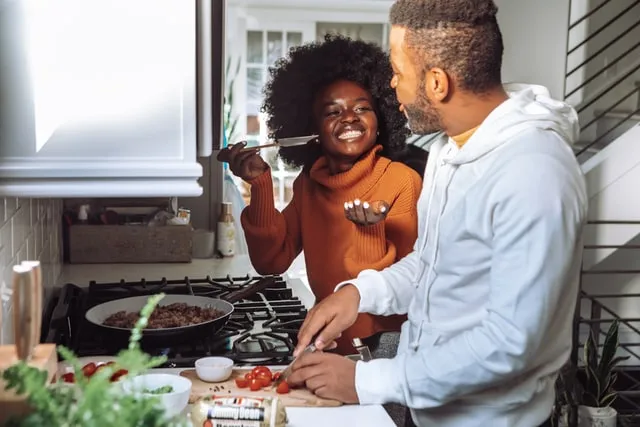5 Simple Patterns In Healthy Relationships

Every relationship, whether it be platonic, romantic, or familial, will have its ups and downs, it's completely normal! As much as we all wish it, life does not come ready with a step-by-step guide on how to live your best life right off the bat. But how do you know if your relationship is having a momentary rough patch or is genuinely toxic?
While everybody is unique and love can look like a multitude of different things, the majority of healthy relationships should have some key similarities. Having fun and genuinely enjoying your time together, acts of appreciation and care, mutual and constant respect for one another even in tough times, and feeling free to speak openly about how you feel are all very baseline, yet often overlooked, qualities your relationship should have!
My significant other and I have been together just shy of 6 years, and while it took a little while to put these valuable relationship skills consistently into action it's become second nature to us. It's almost like a hidden muscle that you need to work out! It's an absolute asset to feel secure and loved in whatever relationship you're in.
Here are some golden pointers on how to make sure your relationship is headed in the right direction.
1. Open Communication

Often, the cause of discourse in any type of relationship can be traced back to a lack of communication. Whether the person feels as though their voice isn't being heard or their wants aren't being met, an open style of communication is a great fallback to solving this incredibly common issue.
Leading with "I feel" statements are usually the best way to tackle this. That way, nobody feels attacked and it makes for a welcoming, non-judgmental environment to have the discussion in. This can look as simple as, "Hey, I feel like we don't spend enough quality time together. I'd love to plan a picnic for tomorrow if you don't have anything planned!" Or even, "It makes me feel unappreciated when you don't ask how my day was." Although starting the conversation can be tough, it's always best to tell the person you love exactly how you feel! After all, honesty is the best policy!
2. Keeping the Respect in Arguments

Disagreements are bound to happen, sometimes it can feel almost impossible not to bump heads, especially if you're living together! But the key thing to keep in mind is that it's you and the other person versus the problem, not you versus them. Although the argument can feel quite personal and hostile at times, continue to remind yourself that you love that person and hurting them would be the last thing you'd want to do, likewise, hurting you should be the last thing they'd want to do as well.
Acknowledging the other person's pain and being humble enough to admit your wrongdoings is also essential. Maintaining "I feel" statements are a great tool in de-escalating disagreements as well as understanding that everybody is human and makes mistakes.
3. Sharing the Workload

There's no better feeling than coming home and finding out the chores you had been dreading all day are already finished. It might not seem like much but taking the extra couple minutes to fold laundry, bathe the kids, prep dinner, or vacuum the house but really does take the weight of the world off of the shoulders of a loved one. Plus, with less time being taken up by boring and mundane activities, there will be more time for fun and relaxation!
4. Understanding Love Languages

Ever heard of love languages? It's essentially how you best receive love from others! There are 5 different love languages: Acts of Service - Doing helpful tasks for your partner. Words of Affirmation - Telling your partner things that encourage them or make them happy. Physical touch - Endearingly touching your partner or being in close contact with them. Gifts - Receiving a gift from your partner, which can be big or small. And finally, Quality Time - Spending undivided time with one another.
While love languages are typically associated with a romantic partner, they could just as easily be utilized to show a friend or family member how much you care about them. Being able to authentically understand how those around you, as well as yourself, desire to be loved is astonishingly impactful and it will strengthen the bonds you share with everybody around you for the rest of your life.
5. Appreciating Each Others Strengths and Weaknesses

Complimentary pairings are absolutely everywhere! Just as cheese is delicious with wine and peanut butter isn't nearly as tasty without jelly, your weaknesses could be your partner's strengths. Maybe you aren't able to parallel park under pressure, but you can fix a broken toilet like no other! Maybe your partner somehow burns every pot of noodles they put on, but they can give a mean foot massage!
Recognizing what you and your significant other are best at and how you each contribute to your relationship can be a fantastic way to begin really appreciating each other, and your individual efforts for one another. Showing gratitude for your partner, especially on a regular basis, really lets them know that you see all their selflessness and hard work and can improve many areas of life.
How many of these patterns did you discover to be in some of your relationships? How will you be incorporating these positive patterns into your daily life? Did you expect to see a few familiar pieces of life advice?
Addressing unhealthy relationships can be one of the most difficult things in life to do, but it doesn't serve for anything! When you rid yourself of toxic people that don't treat you with any worth, changes happen within the body. Some people have described feelings of depression and anxiety improving, along with levels of energy-returning all after ditching toxic, unhealthy relationships. At the end of the day, what's most important is doing what feels right for you!
Opinions and Perspectives
The emphasis on constant respect even during arguments is something I needed to hear.
Started applying these in my workplace relationships too. Amazing how universal they are.
Its refreshing to see relationship advice that focuses on practical actions rather than just feelings.
Understanding these patterns helped me recognize when its time to let go of unhealthy relationships.
Anyone else notice how these patterns create a positive cycle? One good habit leads to another.
The article perfectly captures how small daily actions build strong relationships.
Sometimes its hard to maintain open communication when youre afraid of the response.
Regular practice of these patterns really does make them become second nature over time.
The complementary strengths section made me appreciate my relationship differences more.
Wish schools taught these relationship skills. Would save so many people from heartache.
The part about acts of appreciation reminds me to be more mindful about showing gratitude.
Implementing these patterns has helped me become a better friend and family member.
The article could have mentioned more about maintaining boundaries. Thats also crucial for healthy relationships.
My partner and I take turns doing chores we both hate. Makes it feel more fair and manageable.
Love how practical these tips are. No fancy psychology terms, just straightforward advice.
I realized I was in a toxic relationship when I compared it to these healthy patterns. Really eye-opening.
Struggling with the open communication part. Any tips for someone who grew up in a family where we never talked about feelings?
The workload sharing section should be required reading for all couples moving in together!
Been trying to implement these patterns but my partner seems resistant to change. Any advice?
Good to see an article that addresses all types of relationships, not just romantic ones.
Understanding love languages helped me improve relationships with my kids too, not just my partner.
This reminds me I need to work on being more humble during disagreements with my sister.
The point about gratitude is underrated. Small thank yous go such a long way in maintaining connection.
My partner and I have different love languages and understanding that changed everything for us.
Anyone else feel overwhelmed trying to implement all these patterns at once? Maybe best to start with one at a time.
Really appreciate how this breaks down complex relationship dynamics into manageable steps.
The emphasis on mutual respect is so important. Without that foundation, none of the other patterns can truly work.
Wonder if these patterns apply across different cultures? Some societies might view relationship dynamics differently.
Just tried the I feel approach with my roommate about house cleaning. It worked surprisingly well!
Interesting how the article connects mental health with relationship quality. Makes total sense from my experience.
Sometimes I find it hard to express my feelings without sounding accusatory. The I feel examples are really helpful.
These patterns work great for friendships too. I started showing more appreciation to my friends and our bonds grew stronger.
The part about keeping respect during arguments is crucial. Once you lose that, its really hard to recover.
Love how the article acknowledges that disagreements are normal. Too many people think perfect relationships never have conflicts.
My partner and I started using these patterns after couples therapy and it really transformed our relationship.
Not sure I agree that all healthy relationships need all these elements. Some people prefer more independence.
The idea of working out relationship skills like a muscle is such a great analogy. It takes consistent practice!
I wish I had read something like this years ago. Would have saved me from some really toxic relationships.
Six years together is a good amount of experience to share these insights. They feel authentic rather than just theoretical.
Reading this made me realize how much work I need to do on my own communication skills.
Quality time is definitely my love language. No amount of gifts can replace genuine connection and presence.
Anyone else struggle with maintaining respect during arguments? I find it really challenging when emotions are running high.
The bit about complementary pairings is spot on! My husband and I are complete opposites but it works perfectly.
What about relationships where one person consistently refuses to communicate openly? These strategies only work if both people participate.
Been married 15 years and can confirm these patterns work. Especially the part about appreciating each other's strengths.
I absolutely agree with the workload sharing. Nothing says I love you like coming home to a clean house and folded laundry!
The article makes it sound easier than it actually is. Breaking old communication habits takes a lot more work than just using I feel statements.
My relationship improved tremendously when we started implementing regular check-ins about how we're feeling. Open communication really works!
While I agree with most points, I think sometimes we need to acknowledge that not all relationships can be saved with these patterns.
The concept of you and your partner versus the problem rather than you versus them is something more people need to understand.
Interesting point about toxic relationships affecting mental health. I noticed my anxiety improved significantly after ending a difficult friendship last year.
The parallel parking example made me laugh because that's exactly like my relationship! We each have our unique strengths.
I never thought about using I feel statements during arguments. Usually I get defensive but I'm going to try this approach next time.
The part about sharing workload really hit home. I started doing small chores without being asked and my partner's face lights up every time!
Actually I find the love languages concept a bit overrated. Sometimes people use it as an excuse for incompatibility rather than working on their communication.
I love how this article breaks down healthy relationship patterns in such a practical way. The love languages section really resonated with me!
